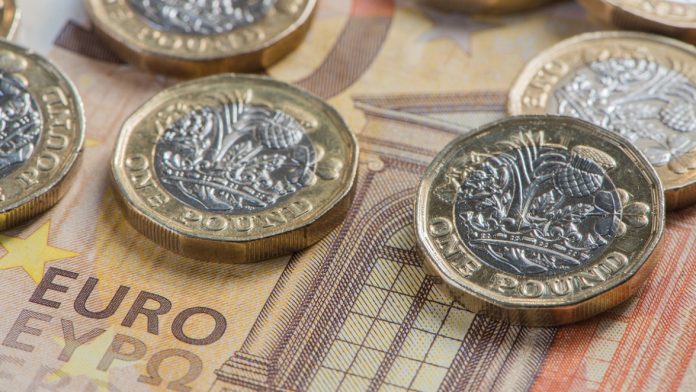The pound plunged in the previous session as the chances of a no deal Brexit increased. The pound euro exchange rate dropped 100 points to a low of €1.0965, before clawing back some losses to close at €1.1021. The pair is heading lower in early trade on Thursday.
| What do these figures mean? |
| When measuring the value of a pair of currencies, one set equals 1 unit and the other shows the current equivalent. As the market moves, the amount will vary from minute to minute.
For example, it could be written: 1 GBP = 1.13990 EUR Here, £1 is equivalent to approximately €1.14. This specifically measures the pound’s worth against the euro. If the euro amount increases in this pairing, it’s positive for the pound . Or, if you were looking at it the other way around: 1 EUR = 0.87271 GBP In this example, €1 is equivalent to approximately £0.87. This measures the euro’s worth versus the British pound. If the sterling number gets larger, it’s good news for the euro. |
The pound dropped then rebounded from session lows as the Queen approved prorogation of Parliament. Prime Minister Boris Johnson will suspend Parliament from 12th September for 5 weeks in order to push a no deal Brexit through. The move has caused uproar among politicians and the British public with many calling it constitutional outrage. The pound dropped.
The move by Boris Johnson takes the UK a step closer to a no deal Brexit. Suspending Parliament just a few days after it restarts following the summer recess is a way for Boris Johnson to protect his Brexit plan and frustrate attempts by MP’s to derail a no deal Brexit. The clock is now ticking for opponents of Boris Johnson to thwart him. Theoretically there is enough time to pass legislation to prevent the UK leaving the EU without a deal. There is also an increased possibility of a vote of no confidence and a general election.
Today Brexit developments will continue to dominate. Boris Johnson’s suspension will face multiple legal challenges and volatility in the pound is expected to pick up as investors constantly reassess the probability of a hard, no deal Brexit
| Why is a “soft” Brexit better for sterling than a “hard” Brexit? |
| A soft Brexit implies anything less than UK’s complete withdrawal from the EU. For example, it could mean the UK retains some form of membership to the European Union single market in exchange for some free movement of people, i.e. immigration. This is considered more positive than a “hard” Brexit, which is a full severance from the EU. The reason “soft” is considered more pound-friendly is because the economic impact would be lower. If there is less negative impact on the economy, foreign investors will continue to invest in the UK. As investment requires local currency, this increased demand for the pound then boosts its value. |
Will German Inflation Data Pull Euro Lower?
The euro was under pressure in the previous session despite Italy narrowly avoiding a snap election. After fraught negotiations Italy’s 5 Star Movement and the centre left Democratic party have agreed to form a coalition government following the collapse of the previous coalition government last week. Italy will not have an Autumn election. This also means that Matteo Salvini, the leader of the League party will remain on the side-lines for a while longer. This is good news for the euro, given Salvini’s desire to spend heavily regardless of Italy’s soaring debt piles.
Today German economic data will be back under the spotlight. German unemployment and German inflation figures will be closely watched. Analysts are expecting German inflation to have dropped in August to 1.5% year on year down from 1.7% the previous month. Weak inflation in Europe’s largest economy could boost the case for a rate cut from the European Central Bank in September.
| Why do interest rate cuts drag on a currency’s value? |
| Interest rates are key to understanding exchange rate movements. Those who have large sums of money to invest want the highest return on their investments. Lower interest rate environments tend to offer lower yields. So, if the interest rate or at least the interest rate expectation of a country is relatively lower compared to another, then foreign investors look to pull their capital out and invest elsewhere. Large corporations and investors sell out of local currency to invest elsewhere. More local currency is available as the demand of that currency declines, dragging the value lower. |





